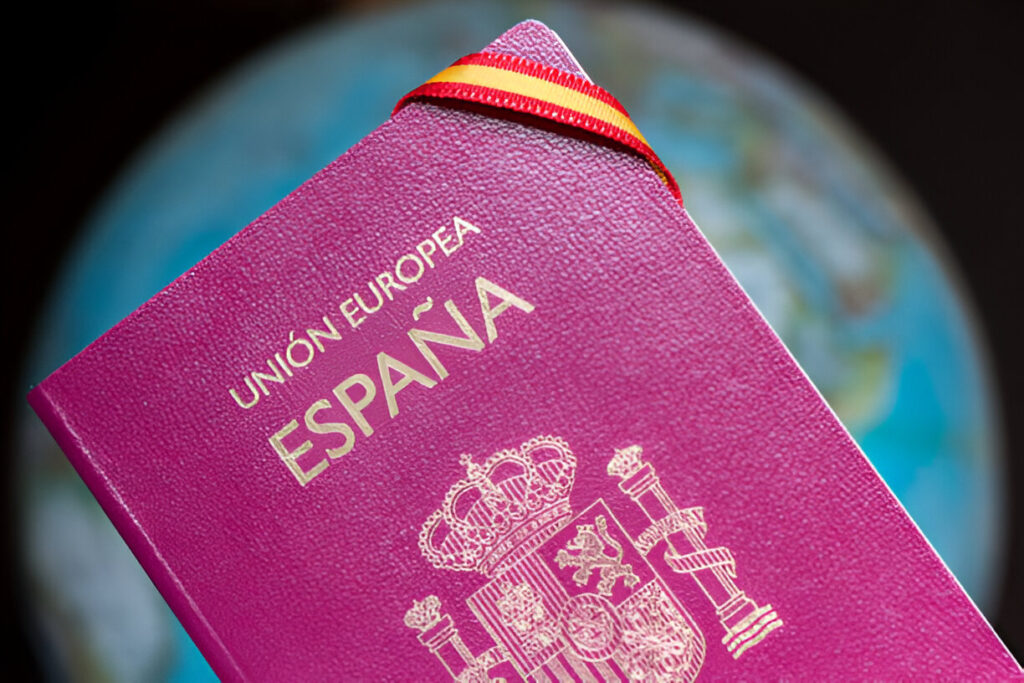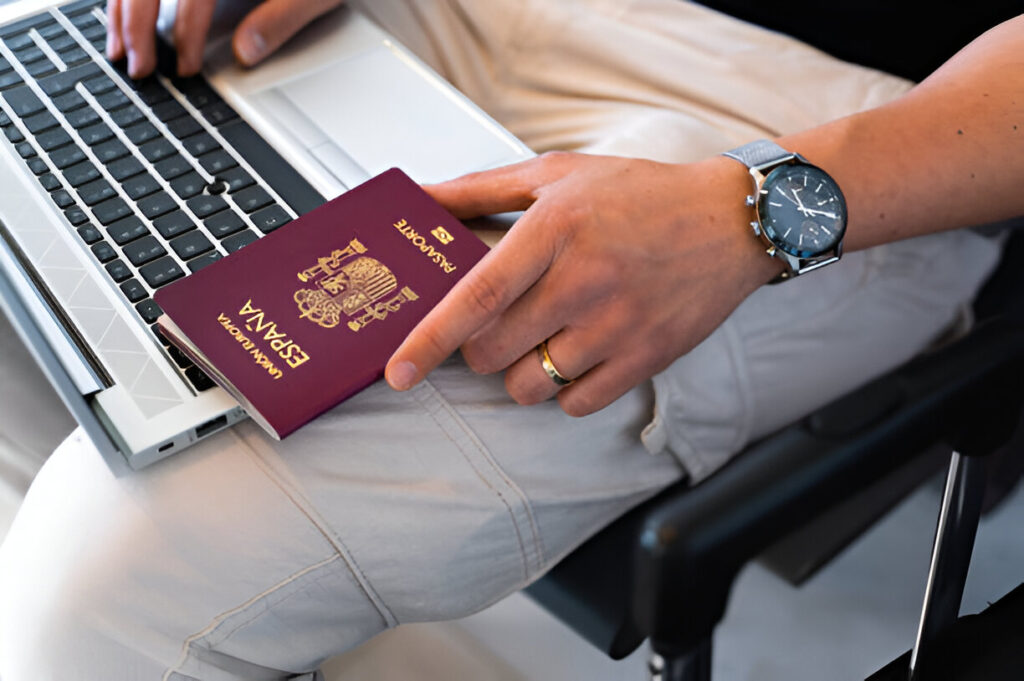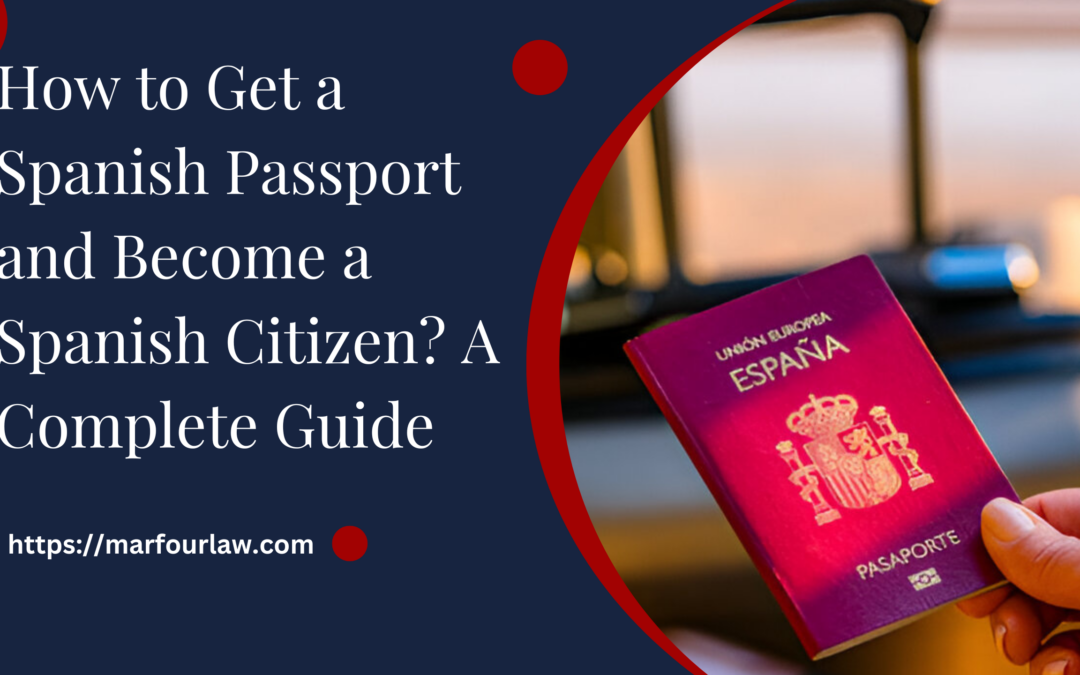If you’re wondering how to get the Spanish Passport, you’ve come to the right place. Whether you’re considering moving to Spain, have fallen in love with the culture, or are looking for a second citizenship, understanding the process of acquiring a Spanish passport can open doors to new opportunities. In this guide, we’ll walk through everything you need to know about obtaining Spanish citizenship, what benefits it offers, and the necessary steps to make it happen. From the requirements and procedures to frequently asked questions, we’ve got it all covered.
How to Become a Spanish Citizen?
Becoming a Spanish citizen is a significant and rewarding process, and understanding each step will help ensure that your application goes smoothly. Below, we’ll go through the detailed steps involved in obtaining Spanish citizenship, covering everything from residency to final approval.
1: Determine Your Eligibility
Before you start the process, it’s crucial to understand which route to Spanish citizenship is right for you. Here are the primary pathways:
- Naturalization: This is the standard route for individuals who have legally resided in Spain for ten years. However, citizens from certain countries benefit from reduced residency requirements:
- Two Years: If you are from Latin America, Andorra, the Philippines, Equatorial Guinea, or Portugal.
- Descent: You may qualify for citizenship if you have Spanish grandparents or parents. This route allows you to claim citizenship through your family lineage.
- Marriage: If you are married to a Spanish citizen, you can apply for citizenship after just one year of legal residency in Spain.
- Refugee Status: Refugees can apply for citizenship after five years of legal residency, providing a pathway for those who have fled persecution.
2: Obtain Legal Residency
To be eligible for citizenship, you must first obtain legal residency in Spain. Different types of residency permits cater to various needs:
- Non-Lucrative Visa: Ideal for those who wish to live in Spain without working. You must show proof of sufficient income (usually above a specific threshold) and have valid health insurance.
- Work Visa: If you have a job offer in Spain, your employer can sponsor your work visa. This route often requires a labor market test to ensure no suitable local candidates are available.
- Golden Visa: This option is for investors who purchase property in Spain valued at €500,000 or more. The Golden Visa allows residency without the need for a job offer or business investment.
3: Maintain Legal Residency
Once you have secured your residency permit, you must ensure it remains valid throughout your stay in Spain. Key responsibilities include:
- Renewing Your Visa: Keep track of expiration dates for your residency permit. It’s advisable to apply for renewals several months before your visa expires to avoid lapses in residency.
- Complying with Visa Conditions: Depending on the type of visa you hold, you may have specific obligations to fulfill. For example, non-lucrative visa holders must maintain a minimum income and have health insurance, while work visa holders must remain employed.
4: Meet Residency Duration Requirements
To be eligible for citizenship, you must meet the specific residency duration requirements applicable to your situation:
- General Rule: Ten years of legal residency in Spain.
- Latin American Citizens and Others: Two years of legal residency.
- Refugees: Five years of residency after obtaining refugee status.
- Spouses of Spanish Citizens: One year of legal residency after marrying a Spanish citizen.
5: Prove Language Proficiency
To apply for Spanish citizenship, you must demonstrate sufficient knowledge of the Spanish language. This usually involves:
- Taking the DELE Exam: You need to pass the DELE (Diploma de Español como Lengua Extranjera) exam at level A2 or higher. This is a recognized qualification that proves your ability to communicate in Spanish.
- Preparation Resources: Many language schools in Spain offer courses specifically designed to help you prepare for the DELE exam, including practice tests and study materials.
6: Pass the Cultural Knowledge Exam
In addition to language proficiency, you’ll also need to pass the CCSE (Conocimientos Constitucionales y Socioculturales de España) exam, which assesses your understanding of Spanish culture, society, and the Constitution. To prepare:
- Study Materials: The official government website provides comprehensive study materials, including sample questions and guidelines on what to expect in the exam.
- Test Locations: The CCSE exam is conducted at various locations across Spain and in selected international sites, making it accessible for applicants living abroad.
7: Gather Required Documentation
Once you’ve met the residency and language requirements, it’s time to gather the necessary documents for your citizenship application. Commonly required documents include:
- Application Form: Complete the official citizenship application form (Modelo 790).
- Proof of Residency: Documentation showing your legal residency in Spain for the required duration, such as residency permits and rental agreements.
- Language Certification: A copy of your DELE certificate confirming your language proficiency.
- Cultural Knowledge Certification: A copy of your CCSE exam results.
- Criminal Record Check: A certificate of good conduct from both Spain and your home country, proving you have no significant criminal history.
- Financial Documents: Evidence of financial stability, such as bank statements, employment contracts, or proof of pensions.
- Health Insurance: Proof of valid health insurance coverage that meets Spanish requirements.
8: Submit Your Application
You can submit your citizenship application in one of two ways:
- Online Application: Visit the official website of the Spanish Ministry of Justice to complete your application online. Note that you’ll need a digital certificate to sign your application electronically.
- In-Person Submission: Alternatively, you can submit your application in person at your local Civil Registry. Ensure that you bring all required documents, as incomplete applications may lead to delays or rejection.
9: Wait for Processing
After submitting your application, it will go through a review process. This can take anywhere from several months to over a year, depending on various factors, including:
- Application Volume: High volumes of citizenship applications can extend processing times significantly.
- Completeness of Application: If your application is incomplete or lacks necessary documents, it may be returned for corrections, causing delays in processing.
10: Attend an Interview
In some cases, applicants may be required to attend an interview as part of the citizenship application process. During the interview:
- Verification of Documents: Officials may ask questions regarding your application, your residency in Spain, and your integration into Spanish society.
- Assessment of Language Skills: You may be asked to demonstrate your Spanish language skills during the interview, so be prepared for this possibility.
11: Receive Citizenship Approval
Once your application is approved, you’ll receive a notification from the relevant authorities. Here’s what to do next:
- Oath of Allegiance: You will need to take an oath of allegiance to the King of Spain and promise to obey the Spanish Constitution and laws. This is a formal step that solidifies your new citizenship.
- Obtain Your Citizenship Certificate: After taking the oath, you will receive a certificate confirming your Spanish citizenship, which serves as proof of your new status.
12: Apply for a Spanish Passport
With your citizenship certificate in hand, you can apply for a Spanish passport. This passport grants you the right to travel freely across the EU and enjoy all the rights and privileges associated with being a Spanish citizen, including voting rights and access to public services.
The journey to becoming a Spanish citizen involves several detailed steps, from securing residency to passing language and cultural exams. By carefully following each step and ensuring you meet all requirements, you can successfully navigate the citizenship process. At Marfour International Law Firm, we’re here to provide guidance and support throughout your application journey, making the process as smooth as possible.
Pasaporte Español – Your Gateway to Global Travel
Obtaining a Spanish passport is a significant step for many individuals, whether you’re a native Spanish citizen or have recently gained citizenship through naturalization. This passport not only opens doors to travel but also serves as a vital document that grants you access to various rights and privileges within the European Union and beyond. Here’s a comprehensive guide to understanding the importance of a Spanish passport and the process to acquire one.

Benefits of a Spanish Passport
A Spanish passport provides numerous advantages, making it a valuable asset for global travelers. Here are some of the key benefits:
- Visa-Free Travel: Holders of a Spanish passport can travel to over 190 countries without requiring a visa or by obtaining a visa on arrival. This includes popular destinations across Europe, the Americas, and parts of Asia.
- EU Citizenship: As a citizen of Spain, you are also a citizen of the European Union. This grants you the right to live, work, and study in any EU country without additional permits.
- Access to Consular Support: Spanish passport holders have access to Spanish embassies and consulates worldwide, which can provide assistance during emergencies, including lost passports or medical issues.
- Social Security Benefits: Spanish citizens can benefit from Spain’s social security system, which includes healthcare, unemployment benefits, and pensions.
Eligibility for a Spanish Passport
To apply for a Spanish passport, you must meet specific eligibility requirements. Here’s a breakdown:
- Spanish Citizenship: You must be a Spanish citizen by birth, descent, or naturalization.
- Age Requirement: Minors can obtain a passport with parental consent, but applicants must be at least 18 years old to apply independently.
- Documentation: You will need to provide various documents, such as your national identity card (DNI) or citizenship certificate, proof of residency, and recent photographs.
Application Process
Acquiring a Spanish passport involves several steps, and it’s essential to follow the procedure accurately to avoid delays. Here’s how to apply:
- Gather Required Documents: Collect all necessary documents, including:
- A completed passport application form.
- Your DNI or citizenship certificate.
- Recent passport-sized photos (ensure they meet specific requirements).
- Proof of residency (if applicable).
- Schedule an Appointment: You must schedule an appointment at your nearest police station or passport office that handles passport applications.
- Submit Your Application: During your appointment, present your application form and required documents. You may also be required to provide biometric data (fingerprints).
- Pay the Fee: There is typically a fee associated with the passport application. The amount can vary, so check the current rates beforehand.
Passport Validity and Renewal
A Spanish passport is typically valid for ten years for adults and five years for minors. It’s important to renew your passport before it expires, as many countries require that your passport be valid for at least six months beyond your planned return date. Here’s how to renew:
- Prepare for Renewal: Gather the necessary documents, including your old passport and updated photographs.
- Make an Appointment: Similar to the initial application, you will need to schedule an appointment for renewal.
- Submit Your Renewal Application: Present your documents, and pay the renewal fee.
Travel Considerations
Once you receive your Spanish passport, you can enjoy the freedom of travel. However, it’s essential to consider:
- Travel Restrictions: While a Spanish passport allows for visa-free travel to many countries, always check the specific entry requirements for your destination, as regulations can change.
- Health and Safety: Stay informed about health advisories and safety recommendations for your travel destinations.
A Spanish passport is more than just a travel document; it’s a key that opens doors to a world of opportunities. From facilitating easy access to various countries to ensuring protection under the EU framework, holding a Spanish passport enhances your global mobility and secures your rights as a citizen. Whether you’re planning a vacation, business trip, or relocation, the Spanish passport is your gateway to exploring the globe with confidence.
At Marfour International Law Firm, we can assist you throughout the process of obtaining your Spanish passport, ensuring that you have all the necessary information and support. Reach out to us for expert guidance on navigating the complexities of Spanish citizenship and passport applications.
Common Challenges and How to Overcome Them
When dealing with legal matters, challenges can pop up from every corner. Whether you’re handling a property transaction, facing a dispute, or trying to get a visa, things can get tricky. At Marfour International Law Firm, we’ve seen it all, and we’re here to help. Let’s dive into some common challenges you might encounter and how you can tackle them.

Communication Issues
One of the biggest hurdles in any legal situation is often communication. Misunderstandings can lead to frustration and mistakes. Picture this: you’re working on a deal, and your lawyer uses a ton of legal jargon. It can feel like you’re trying to read a foreign language.
To avoid this, make sure you’re asking questions whenever something isn’t clear. Your legal team should explain things in simple terms. If you don’t feel comfortable asking questions, it’s a sign you need to find someone who can communicate better with you. Good communication is key to a smooth process.
Financial Concerns
Legal processes can be expensive, and that often causes stress. You might worry about fees piling up or whether you can afford the services you need. It’s similar to getting a surprise bill at the end of the month—nobody likes that.
The best way to handle this is to have an upfront conversation about costs. Ask for a clear breakdown of fees before starting. This transparency helps you plan your budget effectively. At Marfour, we strive to be upfront about all potential costs, so you won’t have any nasty surprises.
Bureaucratic Delays
Another common issue is dealing with bureaucracy. Think about waiting in line at the DMV—long, tedious, and often frustrating. Legal processes can feel just like that. Whether it’s waiting for permits, approvals, or responses from government bodies, it can test your patience.
To tackle these delays, keep track of your applications and stay in touch with your lawyer. Regular follow-ups can help ensure that your case doesn’t get lost in the shuffle. And remember, while it can be frustrating, these processes often take time. Keeping a positive outlook can make a big difference.
Emotional Strain
Legal matters can be emotionally draining. You might feel stressed, anxious, or even overwhelmed. It’s like climbing a steep hill—every step feels heavy, and sometimes it’s hard to see the top.
Finding ways to manage your stress is essential. Consider talking to someone about your feelings, whether it’s a friend, family member, or counselor. At Marfour, we understand the emotional toll that legal issues can take, so we aim to provide not just legal support, but also empathy and understanding.
Lack of Knowledge
Many people find themselves in legal situations without knowing what to expect. This lack of knowledge can be intimidating. It’s like stepping into a maze without a map—you can easily feel lost.
To overcome this challenge, seek information. Your lawyer should provide you with resources to help you grasp the basics of your case. At Marfour, we take pride in educating our clients about their situations, empowering you to make informed decisions.
Uncertainty About Next Steps
When faced with legal issues, it’s common to feel uncertain about what comes next. Imagine being on a roller coaster, unsure of whether the next twist will be thrilling or terrifying. This uncertainty can cause a lot of stress.
The best way to tackle this is to work closely with your lawyer to create a clear action plan. Ask them to outline the steps involved in your case. This plan will give you a better idea of what to expect, making the process feel less daunting.
While legal challenges can seem overwhelming, you’re not alone. By addressing communication, financial, bureaucratic, emotional, knowledge-related, and uncertainty challenges head-on, you can navigate through them with confidence. At Marfour International Law Firm, we’re committed to guiding you every step of the way, ensuring that you feel supported and informed throughout the entire process. Remember, every challenge has a solution; sometimes, you just need the right support to find it.
FAQs
How long do I need to live in Spain before I can apply for citizenship?
The standard requirement is 10 years of legal residency, though this can be reduced to 1 or 2 years in some cases.
Can I keep my Canadian citizenship if I get a Spanish passport?
Spain generally requires non-Latin American nationals to renounce their previous citizenship, but exceptions exist.
What exams do I need to pass for Spanish citizenship?
You’ll need to pass the DELE A2 Spanish language exam and the CCSE cultural exam unless you’re from a Spanish-speaking country.
How long can I stay in Spain without a visa?
Canadian citizens can stay in Spain visa-free for up to 90 days within a 180-day period.
Conclusion
Obtaining a Spanish passport can be a lengthy but rewarding process. Whether you’re motivated by the ease of travel, the chance to work anywhere in the EU, or a deep connection to Spanish culture, the benefits are undeniable. By understanding the requirements and preparing your application carefully, you can make the journey to becoming a Spanish citizen smoother. With your Spanish passport in hand, you’ll be able to enjoy everything this vibrant country has to offer.

